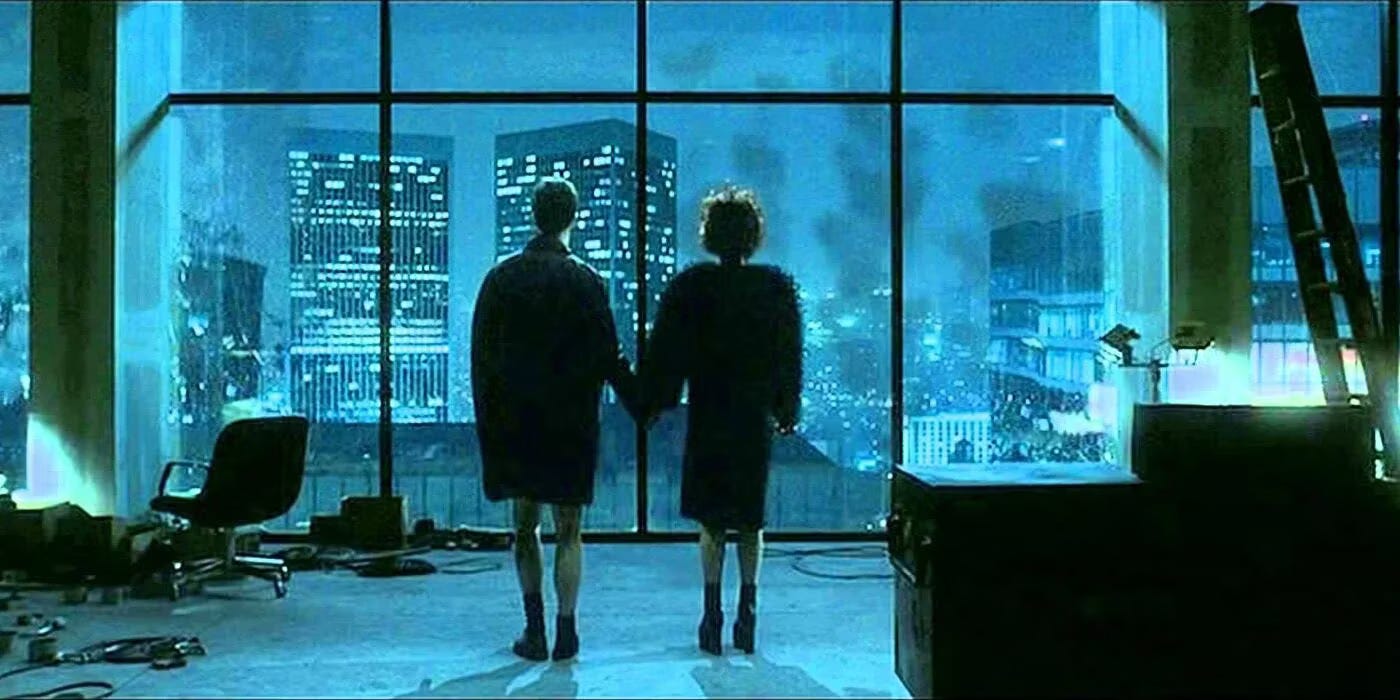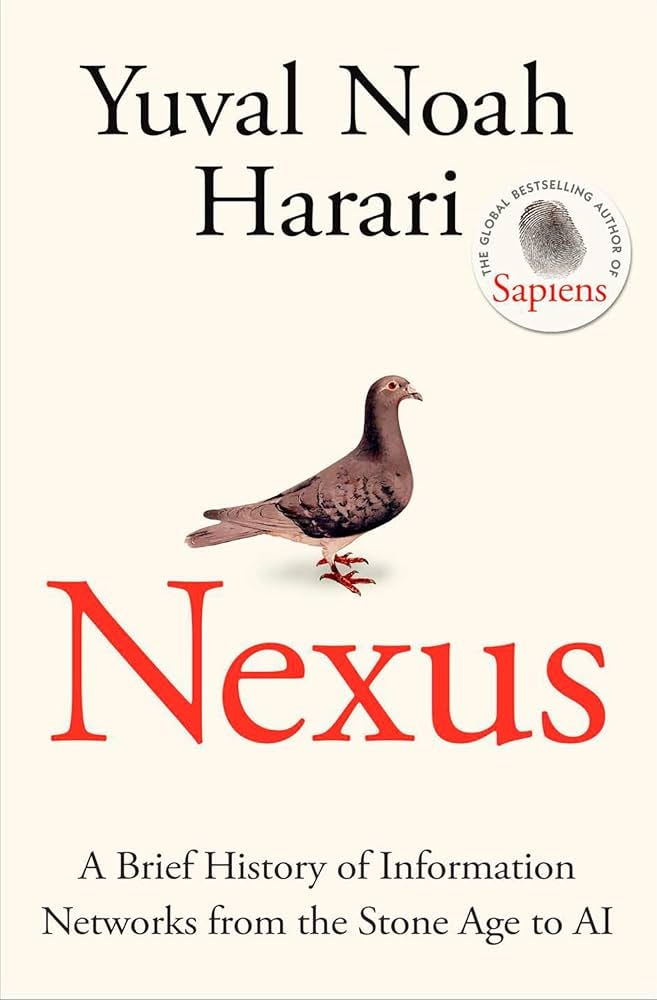Out of the Loop
On "Nexus" by Yuval Noah Harari

The people of southeastern England had had enough. For years their discontent had simmered in the countryside. Noble landlords, faced with a generation of wage increases following the demographic devastation of the Black Death, were attempting to put their subjects back in place. The king was sending his less-than-scrupulous agents to squeeze every peasant they could find to finance his ongoing war in France. And the English commoner—more literate and socially conscious in the plague’s aftermath—began to see what was plainly unfair, and wondered why it couldn’t be different.
In the spring of 1381 the top finally blew off and led to a cascade of extraordinary events. British historian Dan Jones called it the “summer of blood”. The peasants marched on London, virtually conquering the city (and sacking the Tower of London while its resident 14 year-old King Richard II met with some of the rebel leaders). To save his skin, the king made promises, including rent control and an end to serfdom. But long story short, by the end of the year those promises were worth the paper they weren’t written on. The people was crushed in bloody retribution; their leaders, like John Ball and Wat Tyler, were executed; and the English establishment would remember the lessons for centuries.
I’ve always found the Peasants’ Revolt fascinating. Like most revolutions before and after, the rebels specifically exempted the king himself from their anger, directing it instead at his cadre of advisors (like his rich uncle, John of Gaunt) whom they believed were the true villains.
It was also a truly remarkable series of events for the period that presaged (and perhaps contained the seeds of) the social upheaval of the Industrial Revolution over four centuries later. In retrospect, the economic forces that undergirded the spectacle are crystal clear. Forgive the terribly simplistic take, but generally speaking the Black Death killed a whole lot of people, which in turn led to a decades-long labour shortage and a deep reordering of people’s feudal roles, rights and obligations.
But there is always one thing that strikes me above all else: what the peasants wanted, and what they did to achieve it. At every turn, from the revolt’s beginnings to its crescendo in London, they targeted and destroyed written records. They sought out courthouses, noble estates, official buildings, and other notable centres of power because all of these placed housed important legal and binding documents. These documents defined who owned what, who owed what, and who belonged to what land.
This paper trail was the bureaucratic foundation of feudalism—the bars of the figurative prison that kept the vast majority of English peasants and their descendants trapped. The people wanted to break free. It didn’t matter how many royal promises were extracted or which tax collectors were strung up. If the documents persisted, so did the medieval grind.
Does this sound familiar? At the end of Fight Club (the film, not the book), Tyler Durden and his Project Mayhem blow up the office tower headquarters of credit card companies to erase credit histories and get “one step closer to economic equilibrium”. As Durden says, “The things you own end up owning you”.
In Debt: The First 5000 Years, David Graeber points out that in many ancient societies, the records of all debts were routinely expunged in order to restart the “wheel of fortune”, often upon the death of a ruler. Of course, as information technology systems (like the document and the book) advanced, so did the power of those who wielded them. Debt—like ownership, serfdom, feudalism, even slavery—became a permanent feature of society, engraved in laws and stored in archives. And resetting everyone’s score is an anti-establishment fantasy, not an economic policy.
Hey! Enjoying this? Share it with someone you think would dig it too, and nudge them to subscribe. Like and comment—I’d love to hear what you think!
Nexus
This brings me to Yuval Noah Harari’s latest book, Nexus: A Brief History of Information Networks from the Stone Age to AI. Harari talks about the “document” as a critical information technology that has helped shape the modern world. He cites Kafkaesque examples of a nightmarish 20th century bureaucracies that rendered human life totally subservient to documentation—or essentially void if such a document was missing. It’s all part of his central premise: more information isn’t necessarily a good thing.
Maybe that’s less heretical today, when we can all see for ourselves that an overabundance of information can be toxic. But rewind just a few years, and one common assumption in western society was, the more information, the better. The more newspapers we have access to, the better informed we’ll be. The more data we can analyze, the better our conclusions. Isn’t sunlight the best disinfectant? According to Harari, not if it bleaches everything at once.
Unlike AI, humans live on an information diet. Nexus suggests that we could be doom-scrolling our way into another feudal era, where we invite artificial intelligence—an information technology that thrives on maximum information—to rule our lives. The frightening thing is, unlike the English rebels of 1381, we might not even see it happening. In September, I wrote here about Harari’s metaphor for digital modernity: that we have moved from the web to the cocoon. In the cocoon, we are protected from thoughts and ideas that challenge us not only by content-moderating algorithms but, potentially, by an AI that can know and relate to us intimately.
I teach university English and Creative Writing. There is an avalanche of essays written by AI on campuses, and I’m experiencing it first-hand. It’s wise to question what an essay is, and if it’s even useful anymore. But what’s more interesting is when my students send me emails with their thoughts on a reading—written by AI. I could very easily send an AI-written email back. This could go back-and-forth, ad infinitum. And then what are we doing? Or not doing? What roles are we abdicating? Where are we casting ourselves instead?
Decisions are made through language. An AI can make a decision just as easily as I can, regardless of the quality of that decision. For example, Iran’s facial recognition system that Harari describes in Nexus automatically sends threatening texts to women seen driving without headscarves. No human reviews these. The decisions are made and executed in seconds, often upending lives.
Examples like this or China’s digital social credit system paint a picture of totalitarianism that can finally be achieved through artificial intelligence. Nexus charts this path well. It’s frightening in a less bombastic but far more total way than The Terminator or The Matrix.
We’re not just delegating our writing, our thinking, or our decisions to AI. We seem to be running ourselves out of the loop entirely. Unlike the medieval peasants who could see and touch the documents that bound them to their land and lords, we’re building a system of constraints we can barely comprehend, let alone seek out. The Silicon Curtain that Harari warns about isn’t just between nations or platforms. It’s between us and our own institutions. Between our digital and physical selves.
Besides, what would we revolt against? What’s the target here? Many of the rebels of 1381 may not have been able to read them, but they knew exactly what the documents meant. Do we?
Did you enjoy this piece? Would you value future interviews like this? If so, would you prefer more or less detail? What kind of questions would you like to be asked? Let me know!
Reading and Listening
The Fifth Season by NK Jemisin.
Watched Midnight Express (1978). Gripping, edgy, and powerful. Obviously nobody would make a movie like this today because of its treatment of Turkey. But the passion and bravery in the film are a reminder of why 1970s Hollywood is still revered as one of the greatest eras of filmmaking.
What Went Wrong podcast episodes about The Shining, Titanic, and The Silence of the Lambs.
Quote of the Week
“History isn’t the study of the past; it is the study of change. History teaches us what remains the same, what changes, and how things change.”
— Nexus by Yuval Noah Harari



Did I enjoy this piece? No! It's terrifying, ha! But you are raising important points and continually making me aware of what my intuition keeps shouting to me. We don't need more information. We need more quiet solitude and meaning in our lives and need to stop buying into the fantasy that it's "out there"